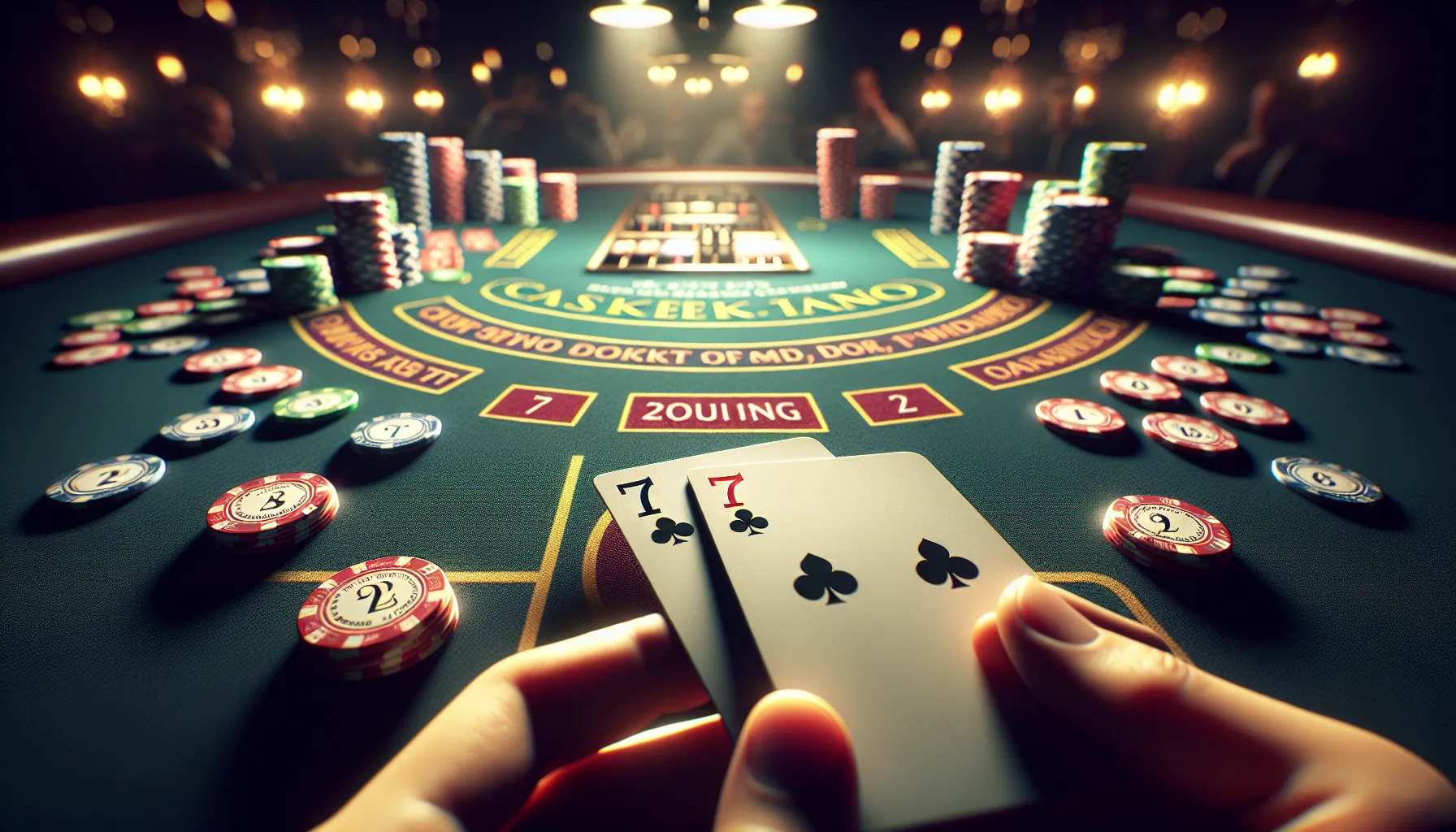Key Takeaways
- Splitting 7s in blackjack can be a smart move, especially when the dealer’s upcard is between 2 and 7, as it increases your chances of building stronger hands.
- Avoid splitting 7s when the dealer has a strong upcard, such as 8, 9, 10, or Ace, as the odds are less favorable.
- Always consider table rules, such as whether re-splitting or doubling down is allowed, as they can significantly impact the success of splitting strategies.
- Analyze key factors like the dealer’s upcard, your bankroll, and playing style before deciding to split, ensuring an informed decision.
- Common mistakes include blindly splitting without evaluating the dealer’s upcard, mismanaging a hard 14, and overextending your bankroll in marginal situations.
- Mastering basic blackjack strategy, understanding table dynamics, and practicing regularly are essential to improving decision-making and long-term success.
Blackjack’s one of those games that’s simple to learn but full of little decisions that can make or break your hand. If you’ve ever been dealt a pair of 7s, you’ve probably wondered, “Should I split them or not?” It’s a common question, and the answer isn’t always as straightforward as you might think.
The choice to split can depend on a few factors, like the dealer’s upcard and your overall strategy. Making the right move here can give you a better shot at winning, but making the wrong one might leave you regretting it. Don’t worry, though—I’ve got you covered.
Let’s dive into why splitting 7s can be a smart move in certain situations and when it’s best to hold off. Blackjack’s all about strategy, and understanding this play can make a big difference at the table.
Understanding Splitting in Blackjack
Splitting is a crucial strategy in blackjack that can influence a player’s chances of winning. Knowing when and how to split pairs, like 7s, can impact the overall outcome of your game.
What Does Splitting Mean?
Splitting in blackjack occurs when a player is dealt two cards of the same rank, such as a pair of 7s. By placing an additional wager equal to the initial bet, I can separate the pair into two hands. Each hand receives an additional card, and both are played individually against the dealer. This strategy creates more opportunities to improve the hand instead of sticking with a less favorable total.
Why Splitting Is Important in Blackjack
Splitting pairs introduces a chance to optimize my gameplay in specific scenarios. For example, with a pair of 7s against a dealer’s upcard of 2 through 7, splitting capitalizes on the dealer’s weaker position. This decision lowers the risk of going bust and increases the probability of achieving a stronger final hand. Proper splitting, guided by basic strategy, can turn disadvantageous situations into opportunities to win.
When To Split 7s In Blackjack

Splitting 7s is a key move in blackjack that depends on the dealer’s upcard and other game dynamics. Using proper strategy can increase your odds of winning and turn a challenging hand into an advantage.
Basic Strategy for Splitting 7s
I always consider the dealer’s upcard before deciding to split 7s. Splitting is typically optimal when the dealer shows a 2, 3, 4, 5, 6, or 7. These upcards put the dealer in weak or neutral positions, making it more likely they’ll go bust. Splitting creates two new hands, each starting with a 7, which affords multiple chances to reach totals closer to 21 without exceeding it.
For example, splitting against a dealer’s 6 means they have a higher chance of failing to make a strong hand, while I get two opportunities to land a favorable total. This move also prevents me from being stuck with a hard 14, which is risky to play and often results in losing. I follow this strategy consistently to increase my long-term success.
Situations Where Splitting 7s May Not Be Ideal
Splitting 7s may not work in some cases, particularly when the dealer’s upcard is strong. If the dealer shows an 8, 9, 10, or Ace, their chances of forming a stronger hand are higher, making splitting less advantageous. In these scenarios, I prefer to refrain from splitting and instead play the 7s as a hard 14, hitting for a better total instead of risking additional bets.
For example, against a dealer’s Ace, I avoid splitting since their odds of securing a blackjack or high total are significant. Additionally, I consider table rules, like whether double-downs are allowed after splitting, as they can affect my decision to split. Adapting to these factors helps me make smarter choices.
Factors to Consider Before Splitting 7s

Deciding whether to split 7s in blackjack means understanding how specific game dynamics influence the choice. I always evaluate the dealer’s upcard, table rules, and my own playing style and bankroll before making this decision.
Dealer’s Upcard
The dealer’s upcard is the most critical factor when deciding to split 7s. I look for dealer upcards between 2 and 7 since these are weaker cards that increase the likelihood of them busting. Splitting in these scenarios gives me two chances to build stronger hands than a hard 14, which is challenging to play effectively. If the dealer shows an 8, 9, 10, or Ace, I avoid splitting as the odds are often unfavorable due to the dealer’s potential to create a high hand.
Table Rules and Variations
Before splitting, I check the specific table rules and variations, as these impact strategy. For example, tables that allow re-splitting or doubling down after splitting 7s offer additional opportunities to maximize potential winnings. In contrast, games with restrictions, like disallowing these options, reduce the effectiveness of splitting. The number of decks in play also matters because fewer decks provide a slight edge in strategy execution.
Personal Playing Style and Bankroll
My approach to splitting 7s depends on my risk tolerance and bankroll size. If my bankroll allows for additional wagers without stress, splitting against weaker dealer cards makes sense. On the other hand, I avoid splitting if I’m working with limited funds or prefer a conservative style, opting instead to play the 7s as a hard 14. Adapting to both the table’s conditions and my financial comfort ensures smarter, more sustainable decisions.
Common Mistakes When Splitting 7s

Failing to evaluate the dealer’s upcard often leads to poor decisions. Players may split 7s against a dealer’s strong card like an 8, 9, 10, or Ace, which increases the risk of losing more money due to unfavorable odds.
Ignoring table rules like re-splitting or doubling down options can reduce the chances of success. Some players overlook these rules, which might otherwise improve their outcomes after an initial split.
Overextending the bankroll by splitting too aggressively creates financial strain. Splitting in marginal scenarios, such as against a dealer’s 8, can quickly drain funds if the odds don’t favor the player.
Opting to split automatically without considering the situation leads to missed opportunities. For instance, when playing against a dealer’s weak upcard, adapting the strategy instead of following a default splitting approach can create better outcomes.
Mismanaging the hard 14 shows poor strategic awareness. Players holding a pair of 7s sometimes split them without recognizing that playing them as a hard 14 might be a safer decision against strong dealer cards.
Tips to Improve Your Blackjack Game
Learn Basic Strategy
I always prioritize mastering basic blackjack strategy. It’s a mathematically-proven method to make optimal decisions based on my cards and the dealer’s upcard. For example, knowing when to hit, stand, split, or double down enhances decision-making and reduces the house edge.
Manage Your Bankroll
I ensure my bets align with my available bankroll. Setting limits for each session and avoiding wagering large amounts on single hands lets me maintain control over my funds. This approach reduces the odds of significant losses.
Pay Attention to the Dealer’s Upcard
Observing the dealer’s upcard influences my decisions. Against weaker cards like 2 through 6, I shift toward aggressive strategies such as splitting or doubling down. Against stronger cards like 10 or Ace, I play more conservatively to minimize risks.
Avoid Insurance Bets
I steer clear of taking insurance when offered. The odds of the dealer having blackjack don’t justify the additional cost. Statistically, this is a losing bet over time.
Understand Table Rules
Knowing table rules impacts my strategy. For instance, tables allowing re-splitting or doubling down after splitting provide more opportunities to optimize outcomes, while restrictions require adapting to fewer strategic options.
Practice Regularly
Practicing with free online blackjack simulators or apps sharpens my skills. These platforms provide a risk-free way to test and refine strategies in different situations.
Stay Focused
Maintaining focus helps me avoid emotional or impulsive decisions. I stick to my strategy and resist the urge to chase losses, ensuring that each decision is based on logic and not frustration.
Conclusion
Deciding whether to split 7s in blackjack isn’t always straightforward, but understanding the strategy can make a big difference in your gameplay. By paying attention to the dealer’s upcard, knowing the table rules, and staying mindful of your bankroll, you can make smarter choices that work in your favor.
It’s all about balancing risk and reward while adapting to the situation at hand. With practice and a solid grasp of basic strategy, you’ll feel more confident navigating tricky decisions like splitting 7s. Remember, blackjack is as much about strategy as it is about luck, so stay focused and enjoy the game!
Frequently Asked Questions
What does it mean to split 7s in blackjack?
Splitting 7s in blackjack means dividing a pair of 7s into two separate hands, requiring an additional bet equal to the original wager. This allows players to play each 7 independently, potentially improving their chances of winning, especially against weaker dealer upcards.
When should I split a pair of 7s?
It’s optimal to split a pair of 7s against dealer upcards of 2 through 7. This strategy takes advantage of the dealer’s weaker position and improves your chances of getting a better hand while minimizing the risk of a hard 14.
Should I avoid splitting 7s against strong dealer cards?
Yes, avoid splitting 7s against strong dealer cards, such as 8, 9, 10, or Ace. In these scenarios, playing the 7s as a hard 14 is often a safer decision to minimize losses.
How do table rules affect the decision to split 7s?
Table rules like allowing re-splitting or doubling down after splitting can impact your decision. Favorable rules can strengthen the case for splitting, especially if they increase your chances of profiting on weaker dealer hands.
Does bankroll size influence whether I should split 7s?
Yes, your bankroll size matters. Players with larger bankrolls may feel more comfortable splitting 7s to take advantage of weak dealer cards. Conservative players with smaller bankrolls might opt not to split and play it safe.
What are common mistakes when splitting 7s?
Common mistakes include failing to evaluate the dealer’s upcard, ignoring table rules that could benefit you, overextending your bankroll by splitting too aggressively, and automatically splitting without considering the situation.
Why is the dealer’s upcard important when deciding to split 7s?
The dealer’s upcard indicates their potential hand strength. Splitting 7s is advantageous against weaker upcards (2-7) as these cards increase the dealer’s chances of busting and improve your odds of winning multiple hands.
Can splitting improve my overall blackjack strategy?
Yes, splitting strategically is an essential part of mastering blackjack. It allows you to optimize your decisions based on the situation, giving you better odds of turning challenging hands into winning opportunities.
Should I take insurance when splitting 7s?
No, it’s generally not advised to take insurance, even when splitting. Insurance bets are unfavorable in the long run and reduce overall profitability in blackjack.
How can I improve my blackjack gameplay overall?
Master basic strategy, manage your bankroll wisely, pay attention to the dealer’s upcard, avoid emotional decisions, practice with simulators, and learn table rules thoroughly to adapt your strategy for success.



